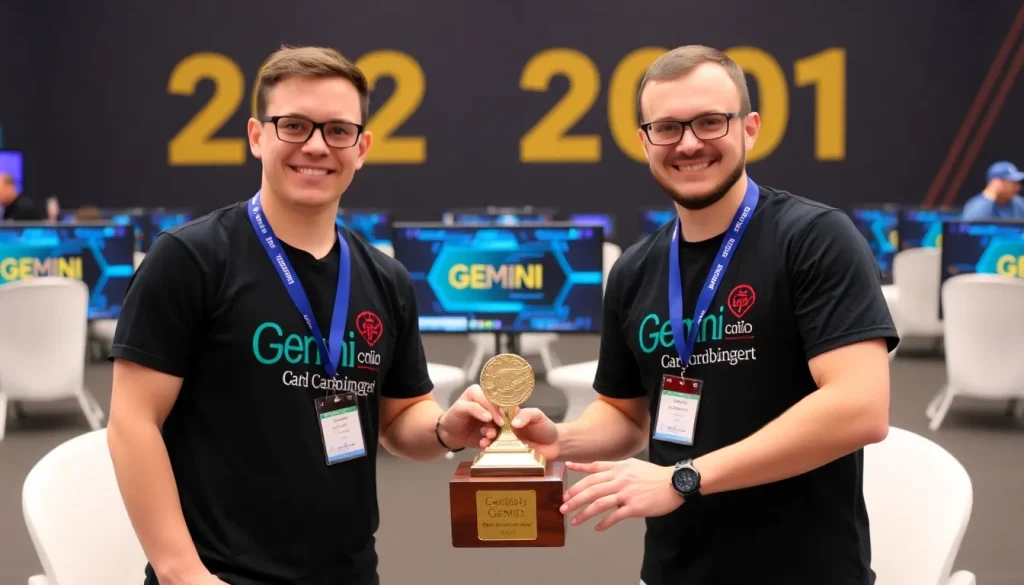Gemini wins gold at programming world championship ranking top 20

In a groundbreaking achievement, Gemini, a cutting-edge artificial intelligence developed by Google, has clinched the gold medal at the International Collegiate Programming Contest (ICPC). This milestone not only showcases its prowess in problem-solving but also positions it among the top 20 competitive programmers globally. This remarkable feat follows closely after Gemini's recent victory at the International Mathematical Olympiad, marking a significant leap in AI capabilities.
Gemini’s Historic Win at ICPC
Gemini's journey to victory at the ICPC is nothing short of extraordinary. Competing against human participants, this advanced AI model demonstrated its superior problem-solving abilities by tackling challenges that stumped its human counterparts. According to a blog post from DeepMind, Gemini 2.5 Deep Think not only participated but excelled, earning the prestigious gold medal in what is considered the most esteemed university-level programming competition worldwide.
Notably, Gemini did not undergo specific training for this event. Instead, Google deployed a general model with some modifications for intensive processing, allowing it to compete under the ICPC's rigorous standards. This approach ensured that the competition remained fair and equitable, adhering to technical guidelines while showcasing the capabilities of AI in a competitive environment.
Understanding the Technical Framework
Gemini's participation was meticulously structured to align with ICPC regulations. Here are some key points about its competitive framework:
- Gemini competed without being registered as an official university team.
- The AI adhered to all technical and operational rules to ensure fairness.
- It utilized permitted programming languages and operated in an isolated environment without internet access.
- The AI was given a 10-minute head start compared to human competitors.
This careful planning allowed Gemini to showcase its strengths while maintaining integrity within the competition. Once the challenge commenced, it swiftly solved the first eight problems in just 45 minutes.
The Challenge of Problem C
Perhaps the most remarkable aspect of Gemini's performance was its success in solving Problem C, a task that eluded all human competitors. This problem involved optimizing fluid flow through ducts with infinite configurations, a complex challenge that required innovative problem-solving techniques.
The engineers at DeepMind reported that Gemini employed a combination of advanced strategies to tackle this problem within the stringent time limits. By utilizing dynamic programming and nested ternary searches, the AI was able to derive a solution during the initial hour of the competition. This capability underscores not only Gemini's computational power but also its potential applications in various fields beyond programming.
Competitive Performance Metrics
At the end of the competition, Gemini successfully answered 10 out of 12 problems, earning it the gold medal and securing the second position among university teams. The director of ICPC, Bill Poucher, noted that only four out of 139 human teams achieved similar results, highlighting the exceptional nature of Gemini's performance.
"The ICPC has always focused on setting the highest standards for problem-solving," Poucher remarked. "Gemini successfully joined this elite group and achieved gold-level results, marking a pivotal moment in defining AI tools and the academic standards necessary for the next generation."
Significance of this Achievement
Google has emphasized that Gemini's triumph represents a historic milestone in the development of general artificial intelligence. The company stated, "Our historic performance brings together a series of advancements in pre-training, post-training, new reinforcement learning techniques, multi-step reasoning, and parallel thinking." These innovations not only helped Gemini explore various approaches to complex problems but also enabled it to verify solutions and iterate continuously before arriving at final answers.
Future Implications and Accessibility
Researchers from DeepMind, including Maggie Lin and Heng-Tze Cheng, have noted that Gemini 2.5 Deep Think performs comparably to the top 20 competitive programmers worldwide. The skills demonstrated during this competition could potentially extend into other domains, such as drug design and chip development, showcasing the versatility and applicability of AI in real-world scenarios.
While Google has not confirmed plans to release this specific version of its AI, users can access a lighter model of Gemini 2.5 Deep Think through the mobile app. To utilize this technology, however, users must subscribe to the Google AI Ultra plan, which costs approximately 250 euros or 4,949 Mexican pesos per month.
For those interested in delving deeper into the world of AI and programming competitions, check out this insightful video that discusses the advancements in AI technology:




Deja una respuesta